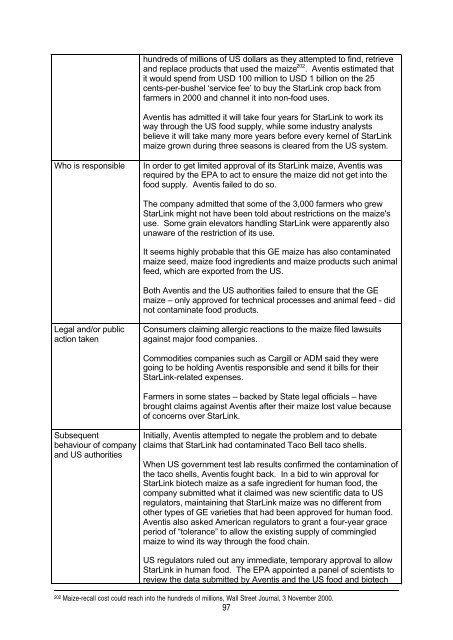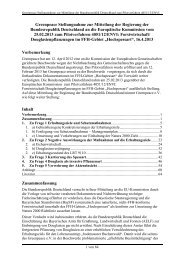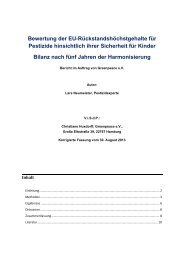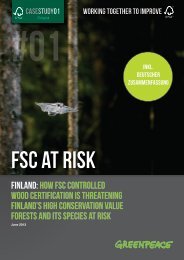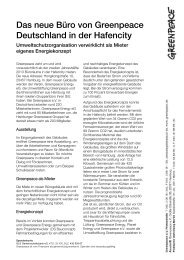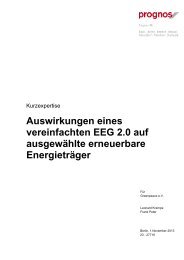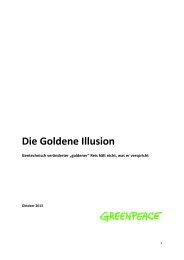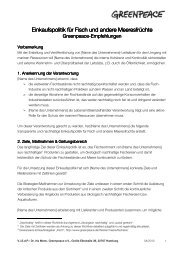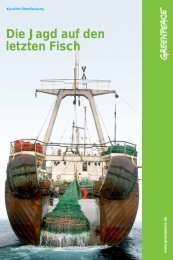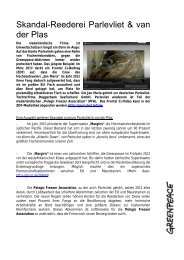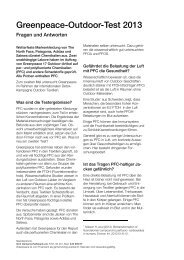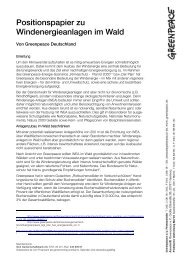Umweltverbrechen multinationaler Konzerne - Greenpeace
Umweltverbrechen multinationaler Konzerne - Greenpeace
Umweltverbrechen multinationaler Konzerne - Greenpeace
Erfolgreiche ePaper selbst erstellen
Machen Sie aus Ihren PDF Publikationen ein blätterbares Flipbook mit unserer einzigartigen Google optimierten e-Paper Software.
hundreds of millions of US dollars as they attempted to find, retrieve<br />
and replace products that used the maize 202 . Aventis estimated that<br />
it would spend from USD 100 million to USD 1 billion on the 25<br />
cents-per-bushel ‘service fee’ to buy the StarLink crop back from<br />
farmers in 2000 and channel it into non-food uses.<br />
Aventis has admitted it will take four years for StarLink to work its<br />
way through the US food supply, while some industry analysts<br />
believe it will take many more years before every kernel of StarLink<br />
maize grown during three seasons is cleared from the US system.<br />
Who is responsible In order to get limited approval of its StarLink maize, Aventis was<br />
required by the EPA to act to ensure the maize did not get into the<br />
food supply. Aventis failed to do so.<br />
Legal and/or public<br />
action taken<br />
Subsequent<br />
behaviour of company<br />
and US authorities<br />
The company admitted that some of the 3,000 farmers who grew<br />
StarLink might not have been told about restrictions on the maize's<br />
use. Some grain elevators handling StarLink were apparently also<br />
unaware of the restriction of its use.<br />
It seems highly probable that this GE maize has also contaminated<br />
maize seed, maize food ingredients and maize products such animal<br />
feed, which are exported from the US.<br />
Both Aventis and the US authorities failed to ensure that the GE<br />
maize – only approved for technical processes and animal feed - did<br />
not contaminate food products.<br />
Consumers claiming allergic reactions to the maize filed lawsuits<br />
against major food companies.<br />
Commodities companies such as Cargill or ADM said they were<br />
going to be holding Aventis responsible and send it bills for their<br />
StarLink-related expenses.<br />
Farmers in some states – backed by State legal officials – have<br />
brought claims against Aventis after their maize lost value because<br />
of concerns over StarLink.<br />
Initially, Aventis attempted to negate the problem and to debate<br />
claims that StarLink had contaminated Taco Bell taco shells.<br />
When US government test lab results confirmed the contamination of<br />
the taco shells, Aventis fought back. In a bid to win approval for<br />
StarLink biotech maize as a safe ingredient for human food, the<br />
company submitted what it claimed was new scientific data to US<br />
regulators, maintaining that StarLink maize was no different from<br />
other types of GE varieties that had been approved for human food.<br />
Aventis also asked American regulators to grant a four-year grace<br />
period of “tolerance” to allow the existing supply of commingled<br />
maize to wind its way through the food chain.<br />
US regulators ruled out any immediate, temporary approval to allow<br />
StarLink in human food. The EPA appointed a panel of scientists to<br />
review the data submitted by Aventis and the US food and biotech<br />
202 Maize-recall cost could reach into the hundreds of millions, Wall Street Journal, 3 November 2000.<br />
97


